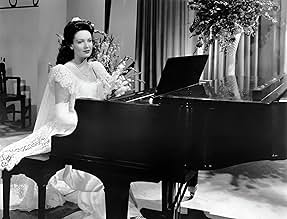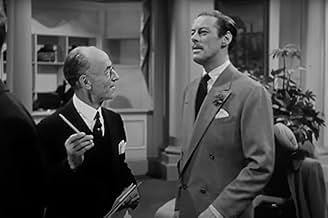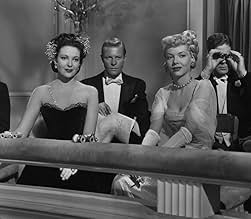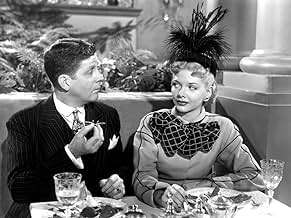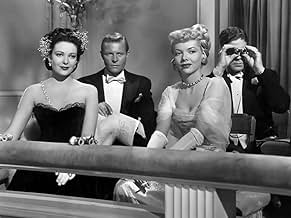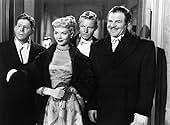CALIFICACIÓN DE IMDb
7.4/10
6.1 k
TU CALIFICACIÓN
Agrega una trama en tu idiomaA man dreams of revenge when he suspects his wife is unfaithful.A man dreams of revenge when he suspects his wife is unfaithful.A man dreams of revenge when he suspects his wife is unfaithful.
- Dirección
- Guionista
- Elenco
- Premios
- 1 premio ganado en total
Al Bridge
- House Detective
- (as Alan Bridge)
Abdullah Abbas
- Concert Attendee
- (sin créditos)
Pati Behrs
- Minor Role
- (sin créditos)
George Beranger
- Maître d'hôtel
- (sin créditos)
Evelyn Beresford
- Madame Pompadour
- (sin créditos)
Georgia Caine
- Dowager in Concert Box
- (sin créditos)
James Carlisle
- Concert Attendee
- (sin créditos)
Harry Carter
- Reporter
- (sin créditos)
Bill Cartledge
- Page Boy
- (sin créditos)
- Dirección
- Guionista
- Todo el elenco y el equipo
- Producción, taquilla y más en IMDbPro
Opiniones destacadas
It is rare when a film is so funny that it will give me fits of belly laughter, and Unfaithfully Yours is one of them. Rex Harrison stars as an English aristocrat and eminent conductor who, despite being madly in love with his wife (played by Linda Darnell) realizes as a result of several misunderstandings that she may be cheating on him. While he is conducting a symphony concert he comes up with three different scenarios in his head of how to deal with her alleged duplicity. Actually carrying out these plans turns out to be an entirely different matter.
Preston Sturges is always an excellent writer and director, but his quick wit and double entendres are a revelation in this film. One almost has to watch it two or three times to get every comment uttered and facial expression portrayed by our protagonist (Harrison). His delivery is superb, sometimes almost funnier than the words he is saying. Darnell and the supporting cast provide excellent straight and slapstick moments. Dudley Moore starred in a remake of this film in the 80's which was also enjoyable, but having now seen this film, I highly recommend the original over the remake. It is an hour and a half of pure delight.
--Shelly
Preston Sturges is always an excellent writer and director, but his quick wit and double entendres are a revelation in this film. One almost has to watch it two or three times to get every comment uttered and facial expression portrayed by our protagonist (Harrison). His delivery is superb, sometimes almost funnier than the words he is saying. Darnell and the supporting cast provide excellent straight and slapstick moments. Dudley Moore starred in a remake of this film in the 80's which was also enjoyable, but having now seen this film, I highly recommend the original over the remake. It is an hour and a half of pure delight.
--Shelly
Rex Harrison comedy in films was mostly of the tongue and mind. He is known in most of his comedic roles for the witty quips, humorous repartee and funny dialog. While there's a smattering of that here, "Unfaithfully Yours" is mostly a departure from the normal Harrison persona. Here he is very funny for his antics and the fumbling, bumbling and pratfalls. He reminds one instantly of the Three Stooges and the Marx Brothers.
Is this a dark comedy, as some think? Is it about the complications of operating modern gadgets? Is it a classical musical in some sense? No, I don't think it's any of these. It's just a straightforward comedy about the foibles and problems that marital jealousy and distrust can cause. And it takes serious pokes at such jealousy in the fantasies that Harrison has after he becomes suspicious of his wife.
That his Sir Alfred De Carter might have dark daydreams about revenge or murder is offset quickly by the humorous situations that follow. And, what person hasn't at one time or another in life fantasized about getting even with someone, even by bumping them off? But only to laugh about such thoughts later? (There may be such a near perfect person or two, but even the best of my acquaintances have had such temptations in their lives.)
A scene with complicating instructions for operating a home recorder seems just a counterpoint to Carter's fantasy about how easy and simple it would be to carry out such a dream. And, the classical music - well that is just the venue in which all of this can develop, because the thought of bumping off his wife was just as horrible to Carter as classical music seemed to Preston Sturges in real life.
How do we know that? Because his wife, Sandy, tells us in an interview with the later DVD release of the movie. She says that Sturges "hated" classical music. He couldn't stand it. She said that they went to a concert one time in which he sat through the entire two-hour program. He railed against it afterwards, and Sandy said it led to his idea for this film. He would use the classical Mozart motif as a torturous undertone for the torturous fantasies brought on by jealousy. Only the humorous foibles would return Carter, the film and the viewers to normal for a spell.
So, classical music lovers, don't take it personally, but the classical music overtone for this film was not intended as a kudos to the genre. Rather, it served as a vehicle for the clever Sturges to concoct and carry out a fanciful revenge and knocking off of his wife. It's in the several different ways and times that he tries and fails that make this movie such a very good comedy. The ending says it all.
Personally, I enjoy classical as well as most forms of music. And I thought it served the purpose Sturges intended for this film and story quite well. All of the cast are very good, but this is a Harrison vehicle all the way.
Is this a dark comedy, as some think? Is it about the complications of operating modern gadgets? Is it a classical musical in some sense? No, I don't think it's any of these. It's just a straightforward comedy about the foibles and problems that marital jealousy and distrust can cause. And it takes serious pokes at such jealousy in the fantasies that Harrison has after he becomes suspicious of his wife.
That his Sir Alfred De Carter might have dark daydreams about revenge or murder is offset quickly by the humorous situations that follow. And, what person hasn't at one time or another in life fantasized about getting even with someone, even by bumping them off? But only to laugh about such thoughts later? (There may be such a near perfect person or two, but even the best of my acquaintances have had such temptations in their lives.)
A scene with complicating instructions for operating a home recorder seems just a counterpoint to Carter's fantasy about how easy and simple it would be to carry out such a dream. And, the classical music - well that is just the venue in which all of this can develop, because the thought of bumping off his wife was just as horrible to Carter as classical music seemed to Preston Sturges in real life.
How do we know that? Because his wife, Sandy, tells us in an interview with the later DVD release of the movie. She says that Sturges "hated" classical music. He couldn't stand it. She said that they went to a concert one time in which he sat through the entire two-hour program. He railed against it afterwards, and Sandy said it led to his idea for this film. He would use the classical Mozart motif as a torturous undertone for the torturous fantasies brought on by jealousy. Only the humorous foibles would return Carter, the film and the viewers to normal for a spell.
So, classical music lovers, don't take it personally, but the classical music overtone for this film was not intended as a kudos to the genre. Rather, it served as a vehicle for the clever Sturges to concoct and carry out a fanciful revenge and knocking off of his wife. It's in the several different ways and times that he tries and fails that make this movie such a very good comedy. The ending says it all.
Personally, I enjoy classical as well as most forms of music. And I thought it served the purpose Sturges intended for this film and story quite well. All of the cast are very good, but this is a Harrison vehicle all the way.
Unfaithfully Yours (1948)
I've never quite loved Preston Sturges as a director or Rex Harrison as an actor, so having the two of them together here didn't bode well, and I thought I'd announce my bias. And sure enough, on this second viewing I was reminded of a kind of crisp calculation that both of them have. Sturges makes amazing movies, no question, and the best of them (Palm Beach Story is my favorite) are hilarious classics. To see this one for what it offers you might first see a classic Sturges screwball from 1941 or 1942. But even those are clinical at heart (if they have a heart), so it's a little like sipping a very dry, clean martini and getting drunk. Alone. No olives. Wit and sophistication do better in the hands of Cole Porter, somehow, but see for yourself.
Harrison the actor overcomes his harsh demeanor in a movie like My Fair Lady because the music and the style there give him some kind of liberty, but here he is supposed to be sympathetic in his demented cruelty, and I only wish him failure. He is, to be sure, plotting the death of his wife. Three times. And then the fourth, beyond the symphony podium, with its madcap bedlam. It's funny in that zany way you have to laugh at. And you will laugh.
I love classical music and like the structure of the film, but as usual with Sturges, this structure makes the whole process detached and too too clever. Sturges himself wrote the screenplay for this idea way back in 1932, and if it had been shot then, before the Hays code, before the real rise of screwball, we would have had a very different movie. But what we have here is admirable and interesting, for sure, if not the zinger it could have been with a different tilt.
I've never quite loved Preston Sturges as a director or Rex Harrison as an actor, so having the two of them together here didn't bode well, and I thought I'd announce my bias. And sure enough, on this second viewing I was reminded of a kind of crisp calculation that both of them have. Sturges makes amazing movies, no question, and the best of them (Palm Beach Story is my favorite) are hilarious classics. To see this one for what it offers you might first see a classic Sturges screwball from 1941 or 1942. But even those are clinical at heart (if they have a heart), so it's a little like sipping a very dry, clean martini and getting drunk. Alone. No olives. Wit and sophistication do better in the hands of Cole Porter, somehow, but see for yourself.
Harrison the actor overcomes his harsh demeanor in a movie like My Fair Lady because the music and the style there give him some kind of liberty, but here he is supposed to be sympathetic in his demented cruelty, and I only wish him failure. He is, to be sure, plotting the death of his wife. Three times. And then the fourth, beyond the symphony podium, with its madcap bedlam. It's funny in that zany way you have to laugh at. And you will laugh.
I love classical music and like the structure of the film, but as usual with Sturges, this structure makes the whole process detached and too too clever. Sturges himself wrote the screenplay for this idea way back in 1932, and if it had been shot then, before the Hays code, before the real rise of screwball, we would have had a very different movie. But what we have here is admirable and interesting, for sure, if not the zinger it could have been with a different tilt.
One of Director Preston Sturges' most enjoyable films, Unfaithfully Yours is a dark comedy which uses the skills of it's leading actors Rex Harrison and Linda Darnell, to perfection.
Harrison plays Sir Alfred De Carter, a famous symphony conductor who has recently wed the beautiful and much younger Daphne (Darnell). Upon returning from a successful concert tour, Sir Alfred is confronted by his brother-in-law August(Rudy Valle), whom he had charged to look after Daphne while he(Sir Alfred)was away. Merely wanting August to drop in on Daphne on occasion, Sir Alfred is shocked to find out that August instead, enlisted a private detective to shadow his wife around town. Outraged when presented with the detective's file, Sir Alfred refuses to even look at it. However, he is eventually confronted with the sleuth's findings, which to his chagrin, reveals that while he was away, Daphne made a very suspicious late night call to a man's room wearing only a negligee. He is further devastated to find out that the rogue in question is his own right-hand man, Tony (Kurt Kreuger), a handsome, dapper fellow more closer in age to Daphne. Believing the worst, Sir Alfred's pristine world is suddenly turned upside down, and he becomes a man consumed with jealousy and suspicion.
From here we watch Sir Alfred's gradual meltdown as the thought of his wife's infidelity haunts his every moment. Even the concert stage can't provide him any solace. While performing before a sold out audience, his mind is less on the music and more on how he will deal with the adulterous duo. With his baton wailing wildly, his mind plays out various fantasies; his first thoughts are of murder, concocting an elaborate scheme which will leave Daphne dead and Tony framed as the killer. In another scenario he sees himself as the forgiving saintly husband, allowing his young wife to leave with his blessing, even going so far as to write her a check to cover their anticipated needs. Finally, he envisions himself cast him as the crazed, pitiful victim, confronting Daphne and Tony and committing suicide before their guilty eyes. As the music ends Sir Alfred has settled on murder as his method of revenge. He abruptly ends his performance and proceeds to put his plan into effect. Hilariously, nothing seems to go quite as smoothly as it had in his vision.
Harrison is masterful as the prim and proper husband who becomes the green-eyed monster bent on revenge. Under Sturges direction, Harrison succeeds in conveying the frailty of the male ego, when faced with the possibility that the little lady may have found the grass a little greener in the neighbor's yard. Darnell as Daphne looks ravishing as the suspected spouse. She ably plays innocent enough to draw doubts about her husband's charges, yet sexy enough to make you believe that the accusations just might be true. A very entertaining movie, I would definitely recommend Unfaithfully Yours particularly for Rex Harrison fans, as this is one of his finest performances.
Harrison plays Sir Alfred De Carter, a famous symphony conductor who has recently wed the beautiful and much younger Daphne (Darnell). Upon returning from a successful concert tour, Sir Alfred is confronted by his brother-in-law August(Rudy Valle), whom he had charged to look after Daphne while he(Sir Alfred)was away. Merely wanting August to drop in on Daphne on occasion, Sir Alfred is shocked to find out that August instead, enlisted a private detective to shadow his wife around town. Outraged when presented with the detective's file, Sir Alfred refuses to even look at it. However, he is eventually confronted with the sleuth's findings, which to his chagrin, reveals that while he was away, Daphne made a very suspicious late night call to a man's room wearing only a negligee. He is further devastated to find out that the rogue in question is his own right-hand man, Tony (Kurt Kreuger), a handsome, dapper fellow more closer in age to Daphne. Believing the worst, Sir Alfred's pristine world is suddenly turned upside down, and he becomes a man consumed with jealousy and suspicion.
From here we watch Sir Alfred's gradual meltdown as the thought of his wife's infidelity haunts his every moment. Even the concert stage can't provide him any solace. While performing before a sold out audience, his mind is less on the music and more on how he will deal with the adulterous duo. With his baton wailing wildly, his mind plays out various fantasies; his first thoughts are of murder, concocting an elaborate scheme which will leave Daphne dead and Tony framed as the killer. In another scenario he sees himself as the forgiving saintly husband, allowing his young wife to leave with his blessing, even going so far as to write her a check to cover their anticipated needs. Finally, he envisions himself cast him as the crazed, pitiful victim, confronting Daphne and Tony and committing suicide before their guilty eyes. As the music ends Sir Alfred has settled on murder as his method of revenge. He abruptly ends his performance and proceeds to put his plan into effect. Hilariously, nothing seems to go quite as smoothly as it had in his vision.
Harrison is masterful as the prim and proper husband who becomes the green-eyed monster bent on revenge. Under Sturges direction, Harrison succeeds in conveying the frailty of the male ego, when faced with the possibility that the little lady may have found the grass a little greener in the neighbor's yard. Darnell as Daphne looks ravishing as the suspected spouse. She ably plays innocent enough to draw doubts about her husband's charges, yet sexy enough to make you believe that the accusations just might be true. A very entertaining movie, I would definitely recommend Unfaithfully Yours particularly for Rex Harrison fans, as this is one of his finest performances.
I was surprised to see only one comment on this film in your files. It's been one of my all-time favorites since I was a youngster about the time it was made. Now that I'm reminded by looking it up here that it was a Preston Sturges film I can see why that's so. His classic comedies were unique. It must be also one of Rex Harrison's greatest films. Being a professional musician myself I can especially appreciate the symphonic ambience in which it takes place. I can also appreciate the possible parody Sturges might have had in mind of the great British conductor of those days, Sir Thomas Beecham. The greatest and most memorable visual effect of the movie (I've certainly remembered it all these years most vividly) happened when the Harrison character has to look up the directions for using the recording machine on which he was going to fake the evidence of his wife's still being alive. Onto the screen flashes the most outrageously complex electrical diagram comprehensible only to a professional electrician. This symbolized the inability of modern man to cope with advanced technology. One of the most hilarious moments in film I've ever seen. More viewers should catch up with this one.
¿Sabías que…?
- TriviaThe camera zooms to a big close-up of Sir Rex Harrison's left eye just before fading to each of Alfred De Carter's infidelity fantasies. Harrison happened to be blind in that eye, the result of childhood measles.
- ErroresThe "recording machine" Rex Harrison was trying to use in his fantasy was not a recording machine at all but a Garrard RC-100 flip-over 1938 record changer.
- Citas
Alfred: Have you ever heard of Russian Roulette?
Daphne De Carter: Why, certainly. I used to play it all the time with my father.
Alfred: I doubt that you played Russian Roulette all the time with your father!
Daphne De Carter: Oh, I most certainly did. You play it with two decks of cards, and...
Alfred: That's Russian Bank. Russian Roulette's a very different amusement which I can only wish your father had played continuously before he had you!
- ConexionesEdited into Myra Breckinridge (1970)
- Bandas sonorasFrancesca da Rimini, Opus 32
(1876) (uncredited)
Music by Pyotr Ilyich Tchaikovsky (as Peter Ilystch Tchaikowski)
Played during the opening credits, at the concert and often in the score
Selecciones populares
Inicia sesión para calificar y agrega a la lista de videos para obtener recomendaciones personalizadas
- How long is Unfaithfully Yours?Con tecnología de Alexa
Detalles
- Fecha de lanzamiento
- País de origen
- Sitios oficiales
- Idioma
- También se conoce como
- Unfaithfully Yours
- Locaciones de filmación
- Productora
- Ver más créditos de la compañía en IMDbPro
- Tiempo de ejecución1 hora 45 minutos
- Color
- Relación de aspecto
- 1.33 : 1
Contribuir a esta página
Sugiere una edición o agrega el contenido que falta



